雅思口语中老是常温的问题
- 格式:doc
- 大小:35.00 KB
- 文档页数:10
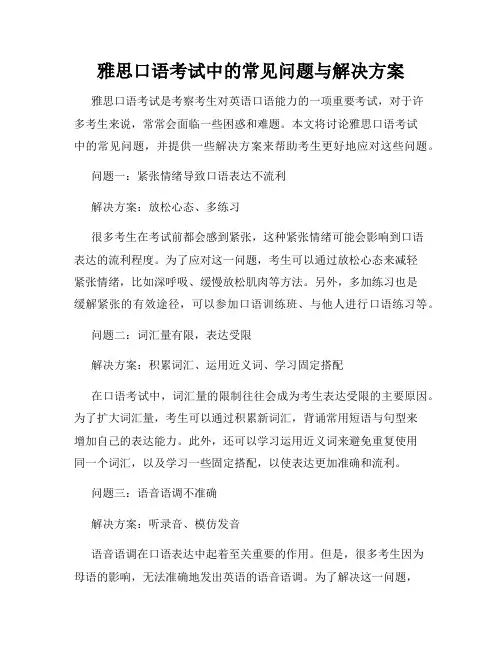
雅思口语考试中的常见问题与解决方案雅思口语考试是考察考生对英语口语能力的一项重要考试,对于许多考生来说,常常会面临一些困惑和难题。
本文将讨论雅思口语考试中的常见问题,并提供一些解决方案来帮助考生更好地应对这些问题。
问题一:紧张情绪导致口语表达不流利解决方案:放松心态、多练习很多考生在考试前都会感到紧张,这种紧张情绪可能会影响到口语表达的流利程度。
为了应对这一问题,考生可以通过放松心态来减轻紧张情绪,比如深呼吸、缓慢放松肌肉等方法。
另外,多加练习也是缓解紧张的有效途径,可以参加口语训练班、与他人进行口语练习等。
问题二:词汇量有限,表达受限解决方案:积累词汇、运用近义词、学习固定搭配在口语考试中,词汇量的限制往往会成为考生表达受限的主要原因。
为了扩大词汇量,考生可以通过积累新词汇,背诵常用短语与句型来增加自己的表达能力。
此外,还可以学习运用近义词来避免重复使用同一个词汇,以及学习一些固定搭配,以使表达更加准确和流利。
问题三:语音语调不准确解决方案:听录音、模仿发音语音语调在口语表达中起着至关重要的作用。
但是,很多考生因为母语的影响,无法准确地发出英语的语音语调。
为了解决这一问题,考生可以多听英语录音,模仿并学习其中的语音语调。
同时,也可以借助一些在线学习资源来进行语音语调训练,比如语音纠正软件等。
问题四:思维逻辑不清晰解决方案:培养逻辑思维、多加练习在口语考试中,思维逻辑的清晰度对于有效地表达和回答问题至关重要。
为了提高思维逻辑的能力,考生可以通过阅读、写作等方式来培养自己的逻辑思维。
此外,多加练习也是提高逻辑表达能力的重要途径,可以通过模拟考试、与他人进行讨论等方式来加强训练。
问题五:时间管理困难解决方案:掌握答题技巧、切忌冗长回答考试时间对于口语考试而言十分有限。
因此,很多考生面临时间不够的困扰。
为了解决这一问题,考生可以在考前掌握一些答题技巧,比如提前规划好回答的思路,尽量避免冗长的回答等。
此外,在考试过程中也应该时刻注意时间的把握,合理安排每一个问题的回答时间。
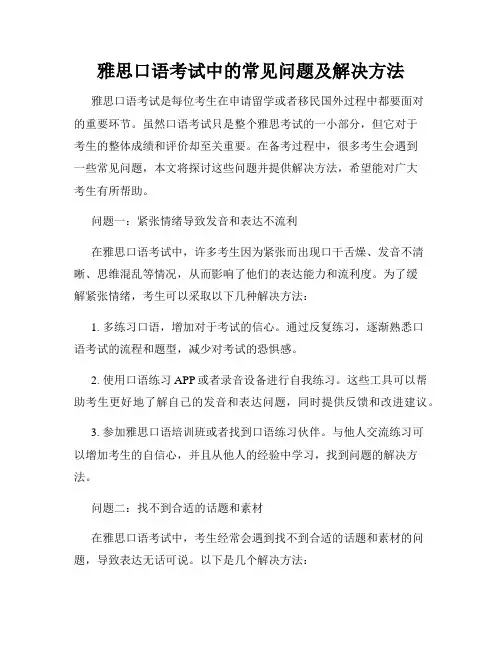
雅思口语考试中的常见问题及解决方法雅思口语考试是每位考生在申请留学或者移民国外过程中都要面对的重要环节。
虽然口语考试只是整个雅思考试的一小部分,但它对于考生的整体成绩和评价却至关重要。
在备考过程中,很多考生会遇到一些常见问题,本文将探讨这些问题并提供解决方法,希望能对广大考生有所帮助。
问题一:紧张情绪导致发音和表达不流利在雅思口语考试中,许多考生因为紧张而出现口干舌燥、发音不清晰、思维混乱等情况,从而影响了他们的表达能力和流利度。
为了缓解紧张情绪,考生可以采取以下几种解决方法:1. 多练习口语,增加对于考试的信心。
通过反复练习,逐渐熟悉口语考试的流程和题型,减少对考试的恐惧感。
2. 使用口语练习APP或者录音设备进行自我练习。
这些工具可以帮助考生更好地了解自己的发音和表达问题,同时提供反馈和改进建议。
3. 参加雅思口语培训班或者找到口语练习伙伴。
与他人交流练习可以增加考生的自信心,并且从他人的经验中学习,找到问题的解决方法。
问题二:找不到合适的话题和素材在雅思口语考试中,考生经常会遇到找不到合适的话题和素材的问题,导致表达无话可说。
以下是几个解决方法:1. 多阅读相关的资料,积累话题和素材。
可以阅读外刊、英语杂志、英语小说等,这些资料不仅能够增加考生的词汇量,还能帮助考生了解各种话题的背景知识。
2. 多进行模拟题练习,积累不同话题的答题经验。
通过反复练习,考生可以在短时间内准备多个话题的素材,提高应对各种话题的能力。
3. 多参与英语口语交流活动,增加口语表达的实践机会。
可以参加英语角、线上英语社群等,与他人进行口语练习和讨论,积累更多的话题和素材。
问题三:回答问题不准确或者不完整在口语考试中,有一部分考生会因为没有准确理解题目或者思维混乱而回答不准确或不完整。
以下是几个解决方法:1. 仔细阅读题目,确保准确理解题意。
可以在展示时间内仔细阅读题目,并在脑海中构思自己的回答,以确保理解准确。
2. 学会使用适当的连接词和扩展语句来完善回答。
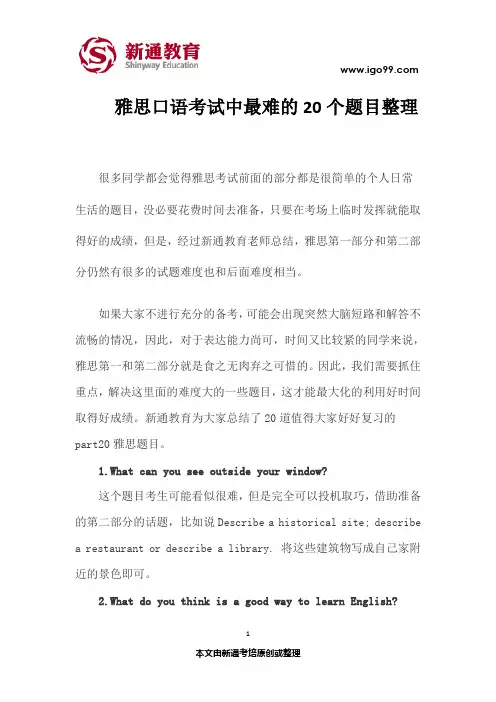
雅思口语考试中最难的20个题目整理很多同学都会觉得雅思考试前面的部分都是很简单的个人日常生活的题目,没必要花费时间去准备,只要在考场上临时发挥就能取得好的成绩,但是,经过新通教育老师总结,雅思第一部分和第二部分仍然有很多的试题难度也和后面难度相当。
如果大家不进行充分的备考,可能会出现突然大脑短路和解答不流畅的情况,因此,对于表达能力尚可,时间又比较紧的同学来说,雅思第一和第二部分就是食之无肉弃之可惜的。
因此,我们需要抓住重点,解决这里面的难度大的一些题目,这才能最大化的利用好时间取得好成绩。
新通教育为大家总结了20道值得大家好好复习的part20雅思题目。
1.What can you see outside your window?这个题目考生可能看似很难,但是完全可以投机取巧,借助准备的第二部分的话题,比如说Describe a historical site; describe a restaurant or describe a library. 将这些建筑物写成自己家附近的景色即可。
2.What do you think is a good way to learn English?可能很多学生认为这个题目很简单,有很多的思路。
但是往往思路越多的时候,越是理不清,说起来很乱。
基本上,考生们需要找到1一条主线,然后顺着主线来讲。
比如说形式:学习英语最好的方式就是通过看英文电影,听英文歌曲以及读英语文章。
然后,这三个内容都是第二部分常考的话题,这时候考生就可以再次借助第二部分准备过的内容来back up你们的答案。
同时,考生还可以加入其它内容,比如说获取这些内容的渠道以及什么时候去练习英文。
3.Do you think it is important to watch movie in the theatre?这个问题相对来说还是有点难度,但是考生可以抓住这样两条主线,电影的种类以及价格。
首先上来,先谈到对于那些对视听效果要求比较高的电影,比如说动作片,或者是恐怖片,电影院是最佳选择,但对于其他的爱情片或者说喜剧片,可能就没有太大的必要了。
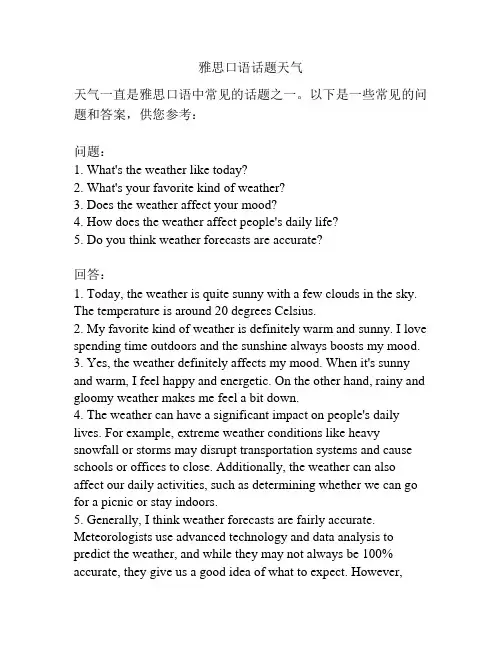
雅思口语话题天气天气一直是雅思口语中常见的话题之一。
以下是一些常见的问题和答案,供您参考:问题:1. What's the weather like today?2. What's your favorite kind of weather?3. Does the weather affect your mood?4. How does the weather affect people's daily life?5. Do you think weather forecasts are accurate?回答:1. Today, the weather is quite sunny with a few clouds in the sky. The temperature is around 20 degrees Celsius.2. My favorite kind of weather is definitely warm and sunny. I love spending time outdoors and the sunshine always boosts my mood.3. Yes, the weather definitely affects my mood. When it's sunny and warm, I feel happy and energetic. On the other hand, rainy and gloomy weather makes me feel a bit down.4. The weather can have a significant impact on people's daily lives. For example, extreme weather conditions like heavy snowfall or storms may disrupt transportation systems and cause schools or offices to close. Additionally, the weather can also affect our daily activities, such as determining whether we can go for a picnic or stay indoors.5. Generally, I think weather forecasts are fairly accurate. Meteorologists use advanced technology and data analysis to predict the weather, and while they may not always be 100% accurate, they give us a good idea of what to expect. However,there can be occasional errors, especially when it comes to long-term forecasts or predicting unusual weather patterns.。
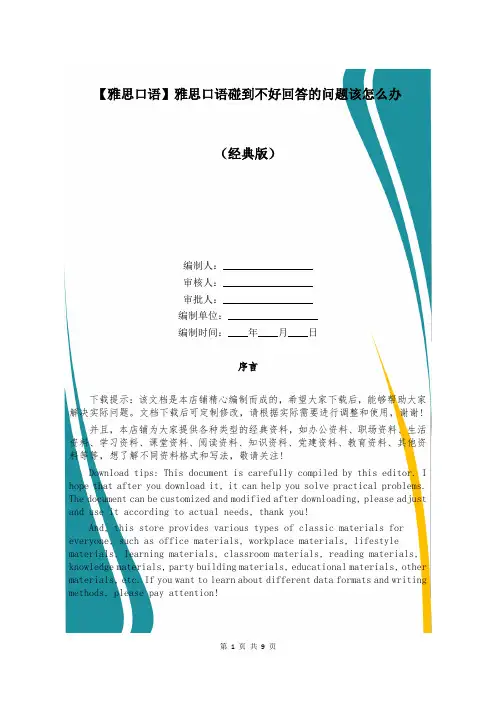
【雅思口语】雅思口语碰到不好回答的问题该怎么办(经典版)编制人:__________________审核人:__________________审批人:__________________编制单位:__________________编制时间:____年____月____日序言下载提示:该文档是本店铺精心编制而成的,希望大家下载后,能够帮助大家解决实际问题。
文档下载后可定制修改,请根据实际需要进行调整和使用,谢谢!并且,本店铺为大家提供各种类型的经典资料,如办公资料、职场资料、生活资料、学习资料、课堂资料、阅读资料、知识资料、党建资料、教育资料、其他资料等等,想了解不同资料格式和写法,敬请关注!Download tips: This document is carefully compiled by this editor. I hope that after you download it, it can help you solve practical problems. The document can be customized and modified after downloading, please adjust and use it according to actual needs, thank you!And, this store provides various types of classic materials for everyone, such as office materials, workplace materials, lifestyle materials, learning materials, classroom materials, reading materials, knowledge materials, party building materials, educational materials, other materials, etc. If you want to learn about different data formats and writing methods, please pay attention!【雅思口语】雅思口语碰到不好回答的问题该怎么办【雅思口语】雅思口语碰到不好回答的问题该怎么办?其实雅思口语考试主要还是想测试语言能力为主,对你的观点并不是很重视,下面一起来看看吧!【雅思口语】雅思口语碰到不好回答的问题该怎么办?网友:既然说雅思口语考试重点是考察考生的交际能力,那么考官问一个问题,如果我觉得很难,不知道该怎样回答,我就说,"I know little about it, could we change a topic?"这样可以吗?会扣分吗?我觉得自己还是在和他交流呀。
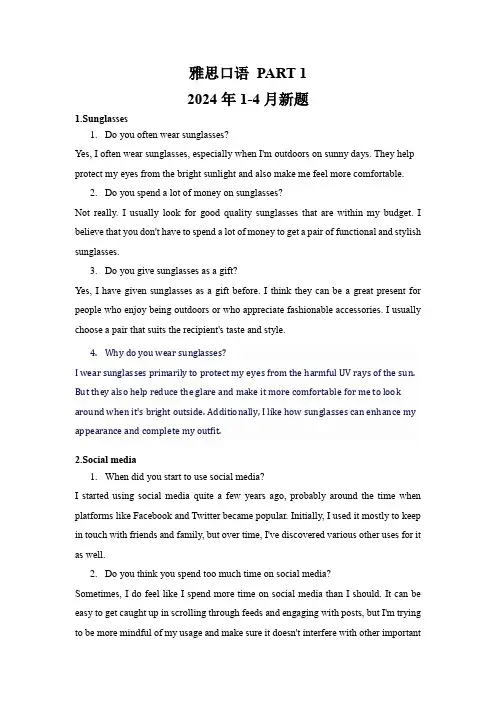
雅思口语PART 12024年1-4月新题1.Sunglasses1.Do you often wear sunglasses?Yes, I often wear sunglasses, especially when I'm outdoors on sunny days. They help protect my eyes from the bright sunlight and also make me feel more comfortable.2.Do you spend a lot of money on sunglasses?Not really. I usually look for good quality sunglasses that are within my budget. I believe that you don't have to spend a lot of money to get a pair of functional and stylish sunglasses.3.Do you give sunglasses as a gift?Yes, I have given sunglasses as a gift before. I think they can be a great present for people who enjoy being outdoors or who appreciate fashionable accessories. I usually choose a pair that suits the recipient's taste and style.4.Why do you wear sunglasses?I wear sunglasses primarily to protect my eyes from the harmful UV rays of the sun. But they also help reduce the glare and make it more comfortable for me to look around when it's bright outside. Additionally, I like how sunglasses can enhance my appearance and complete my outfit.2.Social media1.When did you start to use social media?I started using social media quite a few years ago, probably around the time when platforms like Facebook and Twitter became popular. Initially, I used it mostly to keep in touch with friends and family, but over time, I've discovered various other uses for it as well.2.Do you think you spend too much time on social media?Sometimes, I do feel like I spend more time on social media than I should. It can be easy to get caught up in scrolling through feeds and engaging with posts, but I'm trying to be more mindful of my usage and make sure it doesn't interfere with other importanttasks or activities.3.What do people do on social media?People use social media for a wide range of activities. They share updates about their daily lives, post photos and videos, and engage in conversations with friends and followers. Many also use it to follow news and trends, discover new products and services, and even for professional networking. Additionally, social media has become a platform for expressing opinions, raising awareness about important issues, and organizing campaigns and movements3.Memory1.What do you have to remember to do every day?Every day, I have to remember to check my emails and messages to keep up with work and personal communications. Additionally, I need to remember to complete my daily tasks and responsibilities, whether it's related to my job, studies, or household chores. Staying hydrated and having regular meals is also something I try to remember every day to maintain good health.2.Is it easy for you to forget to do these things?Sometimes, it can be easy to forget to do certain things, especially when I'm busy or have a lot on my mind. However, I try to set reminders or create a to-do list to help me stay organized and ensure I don't overlook any important tasks. I also find that having a routine helps me remember things more easily.3.Are you good at memorizing things?I think I'm decent at memorizing things, but it depends on the type ofinformation. For example, I find it easier to memorize factual information or lists when I associate them with something familiar or create a mnemonic device.However, memorizing abstract concepts or long passages can be more challenging for me.4.How do you help yourself to remember things?To help myself remember things, I use several techniques. I often write down important information or create notes to refer to later. I also use reminders onmy phone or computer to alert me of upcoming deadlines or appointments.Additionally, I try to associate new information with something I already know, which helps me retain it better. Sometimes, repeating the information out loud or discussing it with someone else also helps me to remember.5.Have you ever forgotten something important?Yes, I have forgotten something important before. One example is when I missed a crucial meeting because I forgot to put it in my calendar. It was a valuable lesson for me to always double-check my schedule and reminders to ensure I don't miss anything important again. Since then, I've been more diligent about tracking my appointments and deadlines4.Cake or dessert1.Do you like cakes or desserts?Yes, I do enjoy cakes and desserts, but I try to indulge in them occasionally to maintaina balanced diet.2.Why do some people not like eating sweet food?Some people don't like sweet food because of personal taste preferences, health considerations, cultural backgrounds, dietary restrictions, or simply not enjoying the taste of sugar.5.Video games1.Do you play video games?Yes, I do play video games occasionally. I find them a fun way to relax and unwind after a busy day.2.What kinds of video games do you like to play?I enjoy playing a variety of video games, especially strategy and adventure ones. They challenge my thinking and keep me engaged for hours.3.Is it good for young people to play video games?I believe it depends on the balance. Video games can be beneficial for young people in terms of entertainment and cognitive development, but it's important to strike a balance with other activities like sports and socializing.6.Colours1.What is your favourite colour?My favourite colour is blue. It's calm and relaxing, and reminds me of the beautiful sky and sea.2.Are there any colours that have a special meaning in your culture?Yes, in my culture, red often symbolizes luck, prosperity, and joy, especially during festivals and celebrations.3.Do you usually wear clothes in your favourite colour?Yes, I often wear clothes in blue, as it complements my skin tone and makes me feel comfortable and confident.4.What is your preferred car colour for purchase?If I had to choose, I'd probably prefer a silver car. It's sleek and modern, and goes well with various styles and designs7.Singing1.Do you like singing?Yes, I enjoy singing, especially when I'm feeling happy or relaxed. It's a fun way to express myself.2.Do you have any singing classes at school?No, my school doesn't offer singing classes specifically. But we have music classes where we learn about different musical instruments and genres.3.Do you think there are many Chinese that can sing?Yes, I believe there are many Chinese people who can sing well. Singing is a popular hobby and many Chinese have a natural talent for it. Plus, there's a rich cultural tradition of singing in China.8.Advertising1.Do you like advertisements on TV or some other products?I'm neutral about advertisements on TV and other products. Sometimes they can be informative and entertaining, but too many can be annoying.2.Were there any advertisements that impressed you when you were young?Yes, there were a few advertisements that caught my attention when I was young. One was a toy advertisement that had a catchy jingle and bright colors.3.Will you do work related to advertising?Currently, I'm not planning to work directly in advertising. But I appreciate the creativity and strategy involved in making effective advertisements.4.What kind of advertisements are shown in public places?In public places, you often see billboards and posters advertising various products and services. These can range from food and beverages to clothing and electronics9.Celebrity news1.Do you pay attention to famous people in the news?Yes, I do pay attention to famous people in the news, especially those who are involved in current events or have achieved remarkable feats.2.Do you think news reports about famous people are always true?Not always. Sometimes news reports about famous people can be exaggerated or even fabricated for sensationalism. It's important to verify the source and cross-check information.3.What kind of famous people do you often see in the news?I often see actors, singers, politicians, and sportspeople in the news. Their personal lives, achievements, and controversies often grab headlines.4.Who is your favorite celebrity in your country?My favorite celebrity in my country is an actor known for his talent and dedication to his craft. He inspires me with his hard work and positive attitude.10.Feel bored1.Do you often feel bored?Not often. I usually have enough to do and enjoy keeping busy with various activities.2.What kinds of things would make you feel bored?Repetitive tasks or long periods of inactivity without stimulation would make me feel bored.3.What will you do if you feel bored?If I feel bored, I'll try to find something new and exciting to do, like reading a book, exploring a new place, or engaging in a hobby.4.Do you think childhood is boring or adulthood is boring?I don't think either childhood or adulthood is inherently boring. It depends on the individual's experiences and how they choose to spend their time. Both stages of life can be filled with fun and meaningful activities.11.Crowded place1.Is the city where you live crowded?Yes, the city where I live can be quite crowded, especially during peak hours and in popular areas.2.Is there a crowded place near where you live?Yes, there's a popular shopping mall near my house that's always crowded with people.3.Do you like crowded places?I don't mind being in crowded places occasionally, but I prefer less crowded environments for daily activities. Crowds can be overwhelming sometimes.4.When was the last time you were in a crowded place?The last time I was in a crowded place was probably at a concert last weekend. The venue was packed with fans and it was quite lively.12.Money1.How do you save money?I save money by budgeting, avoiding unnecessary expenses, and investing in long-term savings plans.2.What do you think of e-payment?I think e-payment is convenient and efficient, especially for online transactions. It saves time and reduces the risk of carrying cash.3.Do you often use credit cards?I do use credit cards occasionally, but I'm careful with my spending and always pay off my balance on time.4.Do you think cash will still be popular in the future?While e-payment is becoming more common, I believe cash will still have its place in the future. Some people may prefer it for small transactions or personal reasons.5.Do you like spending money or saving money?I enjoy both spending and saving money. Spending can be fun and rewarding, but saving is also important for financial security and future plans. It's a balance that I try to maintain.。
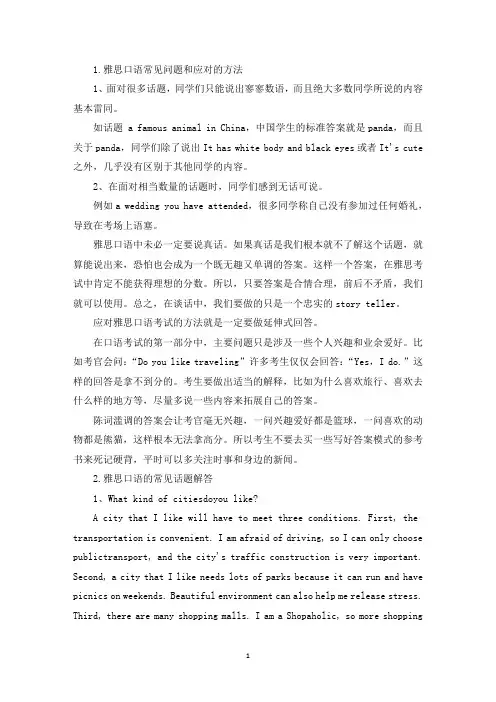
1.雅思口语常见问题和应对的方法1、面对很多话题,同学们只能说出寥寥数语,而且绝大多数同学所说的内容基本雷同。
如话题 a famous animal in China,中国学生的标准答案就是panda,而且关于panda,同学们除了说出It has white body and black eyes或者It's cute 之外,几乎没有区别于其他同学的内容。
2、在面对相当数量的话题时,同学们感到无话可说。
例如a wedding you have attended,很多同学称自己没有参加过任何婚礼,导致在考场上语塞。
雅思口语中未必一定要说真话。
如果真话是我们根本就不了解这个话题,就算能说出来,恐怕也会成为一个既无趣又单调的答案。
这样一个答案,在雅思考试中肯定不能获得理想的分数。
所以,只要答案是合情合理,前后不矛盾,我们就可以使用。
总之,在谈话中,我们要做的只是一个忠实的story teller。
应对雅思口语考试的方法就是一定要做延伸式回答。
在口语考试的第一部分中,主要问题只是涉及一些个人兴趣和业余爱好。
比如考官会问:“Do you like traveling”许多考生仅仅会回答:“Yes,I do.”这样的回答是拿不到分的。
考生要做出适当的解释,比如为什么喜欢旅行、喜欢去什么样的地方等,尽量多说一些内容来拓展自己的答案。
陈词滥调的答案会让考官毫无兴趣,一问兴趣爱好都是篮球,一问喜欢的动物都是熊猫,这样根本无法拿高分。
所以考生不要去买一些写好答案模式的参考书来死记硬背,平时可以多关注时事和身边的新闻。
2.雅思口语的常见话题解答1、What kind of citiesdoyou like?A city that I like will have to meet three conditions. First, the transportation is convenient. I am afraid of driving, so I can only choose publictransport, and the city's traffic construction is very important. Second, a city that I like needs lots of parks because it can run and have picnics on weekends. Beautiful environment can also help me release stress. Third, there are many shopping malls. I am a Shopaholic, so more shoppingmalls can give me more choices.一个让我喜欢的城市必须要满足三点。
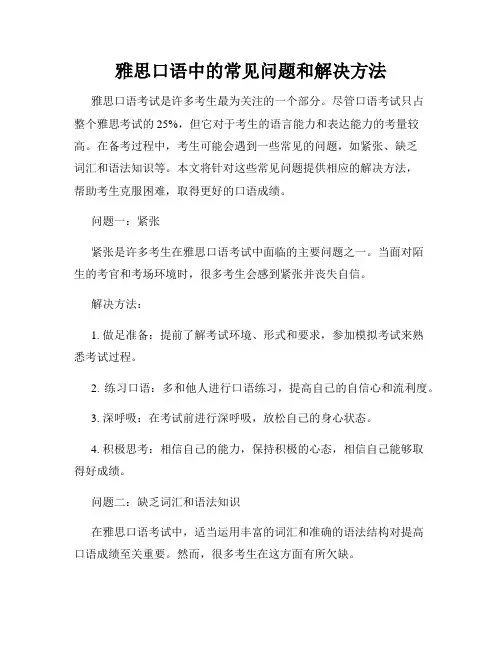
雅思口语中的常见问题和解决方法雅思口语考试是许多考生最为关注的一个部分。
尽管口语考试只占整个雅思考试的25%,但它对于考生的语言能力和表达能力的考量较高。
在备考过程中,考生可能会遇到一些常见的问题,如紧张、缺乏词汇和语法知识等。
本文将针对这些常见问题提供相应的解决方法,帮助考生克服困难,取得更好的口语成绩。
问题一:紧张紧张是许多考生在雅思口语考试中面临的主要问题之一。
当面对陌生的考官和考场环境时,很多考生会感到紧张并丧失自信。
解决方法:1. 做足准备:提前了解考试环境、形式和要求,参加模拟考试来熟悉考试过程。
2. 练习口语:多和他人进行口语练习,提高自己的自信心和流利度。
3. 深呼吸:在考试前进行深呼吸,放松自己的身心状态。
4. 积极思考:相信自己的能力,保持积极的心态,相信自己能够取得好成绩。
问题二:缺乏词汇和语法知识在雅思口语考试中,适当运用丰富的词汇和准确的语法结构对提高口语成绩至关重要。
然而,很多考生在这方面有所欠缺。
解决方法:1. 多读多听:阅读英语材料,提高阅读理解和词汇量;多听英语材料,提高对语言表达的理解和模仿能力。
2. 记单词:每天背诵一些新的单词,并在实际对话中运用。
3. 语法学习:通过语法书籍、参加语法课程等方式提高语法知识的掌握程度。
4. 口语练习:多参与英语口语练习,积极与人交流,提高口语表达能力。
5. 使用学习资源:使用雅思官方指南和雅思口语参考书籍来学习和练习口语技巧。
问题三:缺乏思维准备在雅思口语考试中,考官通常会提问一些广泛的话题,考生需要能够迅速组织自己的思维并给出合适的回答。
然而,很多考生在这方面不够准备。
解决方法:1. 认真学习各类话题:准备一些常见话题的素材,包括个人经历、社会热点、科技发展等。
对于每个话题,考生可以列出一些关键点和观点,以备不时之需。
2. 练习思维拓展:参加一些讨论会或辩论会,提高自己的思维敏捷性和逻辑分析能力。
3. 注重观点的阐述:在回答问题时,除了提供简单的答案,还要注重通过举例、解释和论证来支持自己的观点,提高回答的深度和广度。
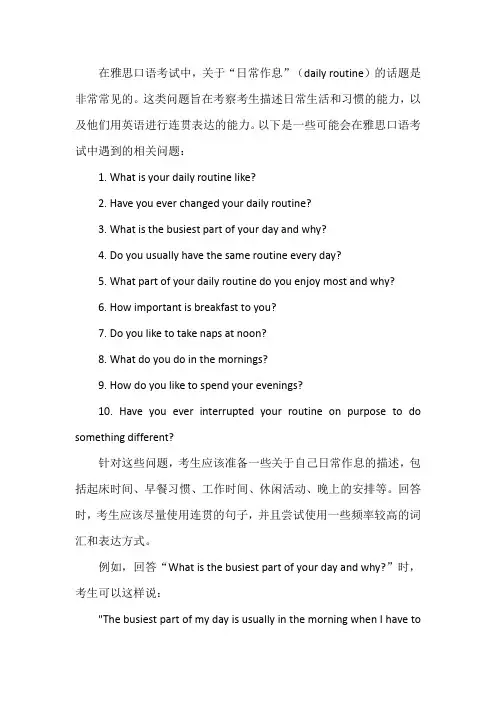
在雅思口语考试中,关于“日常作息”(daily routine)的话题是非常常见的。
这类问题旨在考察考生描述日常生活和习惯的能力,以及他们用英语进行连贯表达的能力。
以下是一些可能会在雅思口语考试中遇到的相关问题:1. What is your daily routine like?2. Have you ever changed your daily routine?3. What is the busiest part of your day and why?4. Do you usually have the same routine every day?5. What part of your daily routine do you enjoy most and why?6. How important is breakfast to you?7. Do you like to take naps at noon?8. What do you do in the mornings?9. How do you like to spend your evenings?10. Have you ever interrupted your routine on purpose to do something different?针对这些问题,考生应该准备一些关于自己日常作息的描述,包括起床时间、早餐习惯、工作时间、休闲活动、晚上的安排等。
回答时,考生应该尽量使用连贯的句子,并且尝试使用一些频率较高的词汇和表达方式。
例如,回答“What is the busiest part of your day and why?”时,考生可以这样说:"The busiest part of my day is usually in the morning when I have toprepare for work and rush to the office. I start my day with a quick breakfast and then I'm off to catch the train. The morning rush hour is hectic because everyone is trying to get to work or school, and the streets are crowded."在回答“Do you usually have the same routine every day?”时,考生可以表示:"For the most part, I stick to a pretty consistent routine. I wake up at the same time every morning, have my coffee, and head to work. In the evening, I usually spend time with my family and catch up on some reading before bed."准备这些话题时,考生应该注意用词的准确性和多样性,以及句子的流畅性。
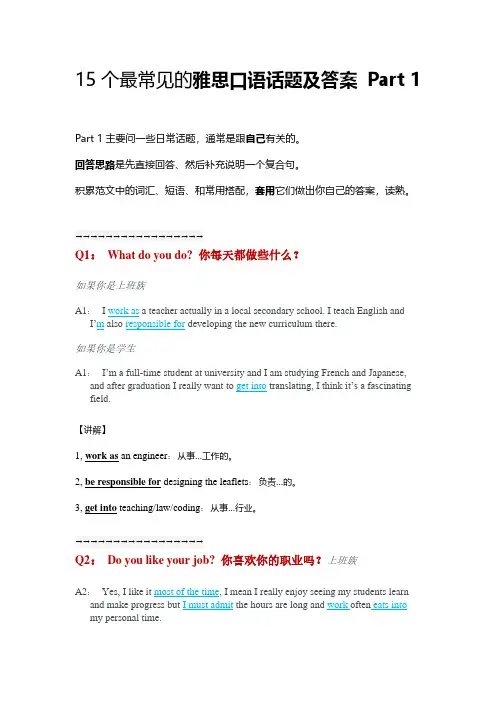
15个最常见的雅思口语话题及答案Part 1Part 1主要问一些日常话题,通常是跟自己有关的。
回答思路是先直接回答、然后补充说明一个复合句。
积累范文中的词汇、短语、和常用搭配,套用它们做出你自己的答案,读熟。
→→→→→→→→→→→→→→→→→Q1:What do you do? 你每天都做些什么?如果你是上班族A1:I work as a teacher actually in a local secondary school. I teach English and I’m also responsible for developing the new curriculum there.如果你是学生A1:I’m a full-time student at university and I am studying French and Japanese, and after graduation I really want to get into translating, I think it’s a fascinating field.【讲解】1, work as an engineer:从事…工作的。
2, be responsible for designing the leaflets:负责…的。
3, get into teaching/law/coding:从事…行业。
→→→→→→→→→→→→→→→→→Q2:Do you like your job? 你喜欢你的职业吗?上班族A2:Yes, I like it most of the time, I mean I really enjoy seeing my students learn and make progress but I must admit the hours are long and work often eats into my personal time.【讲解】1, most of the time后面通常是要表达相反的意见。
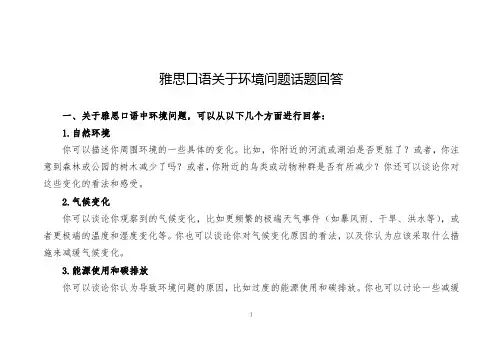
雅思口语关于环境问题话题回答一、关于雅思口语中环境问题,可以从以下几个方面进行回答:1.自然环境你可以描述你周围环境的一些具体的变化。
比如,你附近的河流或湖泊是否更脏了?或者,你注意到森林或公园的树木减少了吗?或者,你附近的鸟类或动物种群是否有所减少?你还可以谈论你对这些变化的看法和感受。
2.气候变化你可以谈论你观察到的气候变化,比如更频繁的极端天气事件(如暴风雨、干旱、洪水等),或者更极端的温度和湿度变化等。
你也可以谈论你对气候变化原因的看法,以及你认为应该采取什么措施来减缓气候变化。
3.能源使用和碳排放你可以谈论你认为导致环境问题的原因,比如过度的能源使用和碳排放。
你也可以讨论一些减缓1气候变化和环境破坏的措施,比如使用更清洁的能源(如太阳能、风能等)、采取节能措施等。
4.环保行动你可以谈论你曾经采取过的一些环保行动,比如回收利用物品、减少塑料消耗、节能等。
你也可以讨论你对鼓励更多人参与环保行动的看法和方法。
二、关于环境问题的雅思口语话题的示例回答:1.话题:Describe a time when you noticed the impact of climate change on your local environment.2.回答:描述一个你注意到的气候变化对当地环境产生影响的具体情况。
例如,我住在一个海滨城市,我发现过去几年海平面上升了。
我注意到海岸线变得更加模糊,有时甚至难以分辨出哪里是海洋和陆地的边界。
解释导致这种变化的原因。
我认为气候变化是一个主要因素,由于全球气温上升,海洋温度也在上升,这导致了海平面上升。
2讨论你看到这种变化后采取的行动。
例如,我试图通过减少使用塑料制品来减轻我的碳足迹,比如使用可重复使用的购物袋和餐具,以及回收利用物品。
我也鼓励我的家人和朋友采取类似的行动来减少他们的碳足迹。
描述这种变化的长期影响可能会是什么。
如果这种趋势继续下去,我担心海平面上升可能会对沿海城市造成更大的破坏,包括洪水和其他自然灾害。
2023年1月雅思口语题part1:Weather答案Part 1Weather1 Do you prefer hot or cold weather?I much prefer it when the weather is nice and hot. Obviously, I don't like it when it's extremely hot, but I like it pretty hot. Perhaps around 35 is a good temperature for me. However, I prefer it when it's a dry heat and not a really humid heat.2 Do you prefer dry or wet weather?I prefer dry weather, but it's nice to have a shower of rain from time to time. It clears the air and is good for the plants – I don't like it when it's months of hot dry weather with no rain. So, ideally, I like pretty hot weather, with a good shower of rain once a week or so.3 What is the weather like in your hometown?In my hometown it is hot and very humid for about 6 months of the year. It's unbearable when it's too hot and humid to be honest – it's hard to breathe and you sweat profusely as soon as you leave the house. Like I mentioned before, hot and dry weather is my favourite, with the occasional rain shower.4 Do you have the habit of checking the weather forecast?I check it fairly often actually. For no particular reason really, just because it pops up on my phone every morning when I wake up, so I look at it. Where I live in China the weather is highly predictable all year round, so we don't really need to be checking the weather forecast all the time, like people do in the UK, for example.。
雅思口语考试中如何避免回答时的尴尬在雅思口语考试中,回答问题时可能会遇到一些尴尬的情况,例如不知道如何回答、回答内容过于简单或直接不符合问题的主题等。
为了应对这些尴尬,以下是一些有效的方法和技巧,使你能够在考试中更自信和流畅地回答问题。
1. 熟悉常见题目在备考阶段,了解并熟悉常见的口语考试题目是非常有帮助的。
阅读并准备回答这些问题,可以帮助你熟悉主题,找到合适的词汇和例子来支持你的回答。
此外,还可以练习在有限时间内组织逻辑和流利地表达观点。
2. 扩大词汇量词汇量是提高口语表达能力的重要因素。
当你遇到不熟悉的问题时,拥有丰富的词汇储备可以帮助你更好地回答。
通过广泛阅读、背诵和使用单词,逐渐扩大词汇量,并使用合适的词汇来描述和解释问题。
3. 练习流利的表达流利的口语表达是口语考试中的关键要素之一。
通过与他人进行口语练习,增加回答问题的机会。
这样可以逐渐提高流利度和语速,同时增强自信心。
练习中,可以尝试使用连贯性词语和短语,如“因此”、“同样重要的是”、“此外”、“一方面……另一方面”等。
4. 学会转移话题当你对某个问题感到不舒服或无法回答时,学会巧妙地转移话题是很有用的技巧。
通过提供相关的背景信息,或者引用与问题相关的个人经验,可以将话题带到你更熟悉和自信的领域。
5. 使用修饰句子使用修饰句子可以帮助你更好地展示你的语言能力和思维深度。
例如,通过使用形容词、副词或插入从句来增加句子的复杂性和信息量。
这样不仅可以提升你的答案质量,也能让你的回答更具说服力。
6. 增加观点和细节在回答问题时,提供详细和具体的细节可以让你的回答更生动、有趣和充实。
这些细节可以包括个人经历、观点、事实或例子,以支持你的回答。
记住,质量大于数量,选择最相关和最有力的观点和细节。
7. 保持冷静和自信无论遇到何种情况,保持冷静和自信都是非常重要的。
当你陷入尴尬时,不要慌张或紧张。
深呼吸几次,放松身体和思维,并以积极的态度去回答问题。
雅思口语第三部分中避免冷场的高分技巧雅思口语第三部分中避开冷场的高分技巧雅思口语技巧:第三部分避开冷场的答题在雅思口语第三部分中,冷静、幽默的方式是避开冷场的最重要的技巧。
西方人对人生似乎看得较开,他们遇到窘境下不了台时,也能泰然处之,甚至以自责或自贬的方式,一笑了之。
1.例如:假如上司带着埋怨的口气说:You did not finish the work when you were supposed to.你该做完的工作而没有做完。
下属也会冷静地说:Yes,I forgot.I need to make sure I remember it next time.是的,我忘了,下次我会记住。
2.在遇到自己犯错时,也会说:I goofed it.我做错了。
3.在遇到自己笨手笨脚做不好一件事时,也会说:Gracious,I seem to be havinga hard time.嗳!我似乎困难重重!4.当学生上课迟到,老师质问时,他会说:You are right. I need to allow myself more time next time.是啊,我下次需要充分的时间。
5.学生在上课时说话,老师要他先举手,他会说:I will remember next time when I have something to say.我下次说话时会记得。
6.遇到别人做错事,他们往往也会宽慰地说:Don‘t worry,this happens sometimes.没关系,这种事情时有发生。
以上这些方法都是会让人有忍俊不禁,会意一笑的效果的,假如考生也能在考场中这样洒脱,确定会让考官另眼相待。
以上就是关于雅思口语第三部分中避开冷场的答题技巧的全部信息,词汇量不是很多,主要的难点是大家在考场上确定要足够冷静,不惊慌,才能想到足够有效的方法来应对。
大家可以在自己平常的备考中进行适当的练习。
雅思口语四大评分标准:Pronunciation“Pronunciation”作为雅思口语四大评分标准之一有着举足轻重的作用。
雅思口语Part2如何避免冷场轻松展开话题雅思口语part2总会发愁怎么说,前面感觉自己已经说了好几句后面尴尬大冷场,雅思考场上怎样解决这样的问题,让自己part2说完雅思考官笑逐颜开?雅思口语Part2如何避免冷场轻松展开话题?雅思口语的Part 2要求学生根据一个话题,准备1分钟后再进行2分钟的描述。
很多学生对这个部分望而生畏,因为回答此部分时,很多学生往往“无话可说”。
雅思考生无话可说的一个主要原因是答题过短,即学生只针对话题相关问题进行简短回答而不展开。
本文中,雅思小编和大家一起看一些简单实用的拓展答题思路的策略,希望能为雅思备考童鞋们突破这个难题助一臂之力。
话题拓展预热:抓重点。
建议雅思考生拿到话题卡后,首先要分析话题句的关键词,其次应找出话题后的问题哪一个最为重要,并以此为重点展开。
其余问题则只需点到为止。
通常来说,雅思口语话题卡相关问题前面3个问题都是时间、地点、人物等背景介绍,不太容易展开;而最后1到2个往往是询问考生看法、观点的问题,因而通常较为容易展开。
雅思考生在读题时,应注意将话题分为三个部分,即话题句部分,简述部分(通常包括前三个问题),详述部分(最后一个或者两个问题),分别采用不同的展开策略。
试以People类型题中的family member为例(原题如下):Describe a family member you spend most time withYou should say:Who the person isHow long you have been togetherWhat you do togetherAnd explain why you'd like to spend time with this person.显然,第1、2、3问题都是时间地点等背景知识,可以展开但显然很难尽情发挥,因而可归纳入简述部分;而第4个问题高兴的原因则可以随意铺陈开来,因而显然成为回答的重点,应该归纳为详述部分,并以此为主进行展开。
Part 1 Topics and Questions1.Your Work/StudiesDo you work or are you a studentYour StudiesWhat subject are you studying(= What's your major? in American English) Why did you choose to study thatWhere do you studyDo you like your university/school(Why?/ Why not?)Does your university specialize in any particular subject/areaIs there anyone who helps (helped) you (with your studies) at university/school(Who In what way?) (Who give you the most help?)Do you often get together with ( = go out with = do things in your free time with ) your classmates after classes(What do you do?)2. Your HometownWhereabouts (=where) did you grow up (Or, Where were you born?)Is that a city or is it in the countryside*Do you still live thereDoes (do) your family still live thereWhat kind of place is your hometown(= Describe your hometown) *How has your hometown changed in recent years(e.g., the past 20 years or since you were a child)What part of your hometown do you like best(Why?) (= What's the best thing about your hometown= What do you find most attractive about your hometown?)What's the most famous (= well-known) place in your hometownNote: One of the two topics above is a compulsory topic.3. Secondary schoolNote 1: It seems that you could be asked about your secondary school studies even if you are working now or a university student now. However, if you are a university student (and especially if you are a secondary student now) and if you answered 1b, above, you probably will not get these questions. Everyone should prepare for this topic because if you get 'Hometown' as your first topic, 'Secondary School' is possible as one of your other topics.Note 2: 'Secondary school' means the same as 'high school'. Unlike China and the U.S.A., most students in Britain and Australia go to one school from the age of about 12 to 18, called 'secondary school' (= high school). However, there are also a small number of 'Junior High Schools' and 'Senior High Schools' in Britain and Australia.What subjects did you study in secondary school (= high school)*What was your favourite subject ( = class) in secondary school(= high school) And which class (= subject) did you like the least(Why?)Which secondary school subject do you think is most useful for people in adult lifeWhat part of your secondary school education did you enjoy most?4. Leisure TimeWhen do you have free timeHow do you like to relax(What’s your favourite way to relax?)How do Chinese people like to relaxDo you think it's important to have leisure timeHow does that (the way Chinese people like to relax) compare with western countriesDo your friends ever come to your home in their free time What do you usually do together?How do you think people will relax in the future*Compare the way people in China relax today and the way they used to relax years ago.In your leisure time, what do you usually do with friends or family(= Do you do things in your leisure time with friends or familyWhat?)Do you have any hobbies or interests(= What are your hobbies or interests?)What do you do in your holidays (= vacations)(= How do you spend your holidays?) Or: How do people in China spend their holidays?Do you like to travel (in your holidays or free time)(Why?)5. RainDoes it rain much in China(WhereWhen?)Is there any part of China where it doesn't rain much(Where?) (or: Is there an even distribution of rain throughout China?)When (in what month/season) does it rain most in your hometownWhat about the other parts of China(In which season does it rain most in other parts of China?)Can you remember any time when it rained particularly heavily in your hometown(When?)Does rain ever affect transportation in your hometown(How?)How does rain affect different people’s moods (Or: How does rain effect people'slives?)Do you like rainy days(= How do you feel on rainy days= Do you feel sad on rainy days?)What do you do on rainy dayDo you think rain is good(Why?)Do you think the seasons have changed in recent years, compared to the past 6. RestaurantsDo you usually go out to eat or do you usually eat at homeHow often do you go to a restaurant (to eat)(Do you often go to restaurants (to eat)How often?)Why do you (or, why do people) go to restaurantsWhat kind of restaurants do you like(prefer) (Why?) (Or, How do you choose which restaurant to go to?)What kind of restaurants do young people in China prefer(Why?)What do you usually do thereWhat kind of foods do you (or Chinese people) like to eat in restaurantsHow (do you think) restaurants have changed, over the past few years(=How are restaurants today different to those of before?)How do you think they will (might) change in the future*What skills do people need to work in a restaurant?7. LettersDo you often write letters(How often do you write letters?)Who do you usually write to and what do you write aboutWhat (do you think) is the most difficult kind of letter (or email) to write(Why?) Do you prefer to write letters or emails(Why?)What role do emails (or letters) play in your life( = Why do you write these emails or letters?)How often do you write emailsWhat kinds of emails (or letters) do you most like receiving(Why?) (= What kinds of emails/letters make you happy?)What are the differences between handwritten letters and emailsDo you think it is a good thing that some companies send out letters/spam emails for the purpose of advertising*8. Television and RadioWhat kind of entertainment do you prefer, TV or radio(Why?)How are radio programs and television programs differentWhat programs do you like to watch/listen toWhen do you watch TV/listen to the radioIn China, has television/radio changed much in recent yearsHow do you think TV/radio broadcasts in China could be improvedDo you prefer TV news or news on the radio(Why?) *9. Daily RoutineTell me something about your daily routine.(If you do not work) For you, what's the best time of day for studying(If you work) For you, what's the best time of day (or, day of the week) for working?What part of the (= your) day do you like best(Why?)If you could make one change to your daily routine, what would it be?If you had more free time, what would you doDo you get together with your fellow students/work colleagues (=classmates/workmates) after classes/work(What do you do?) [This questions possibly in Work/Studies topic.]10. TravelDo you like to travel (in your holidays or free time)(Why?)Do you think it's important to travel during your holidays(Why?/Why not?)Do you think it's necessary to travel in order to enjoy your holidays(Why?/Why not?)Where do you like to go(If you say you like to travel or do, in fact travel in your holidays.)Are holidays important (to people/to you)(Why?) Or: Do you think holidays are necessary(Why?) Or: Why do we need to have holidays?。